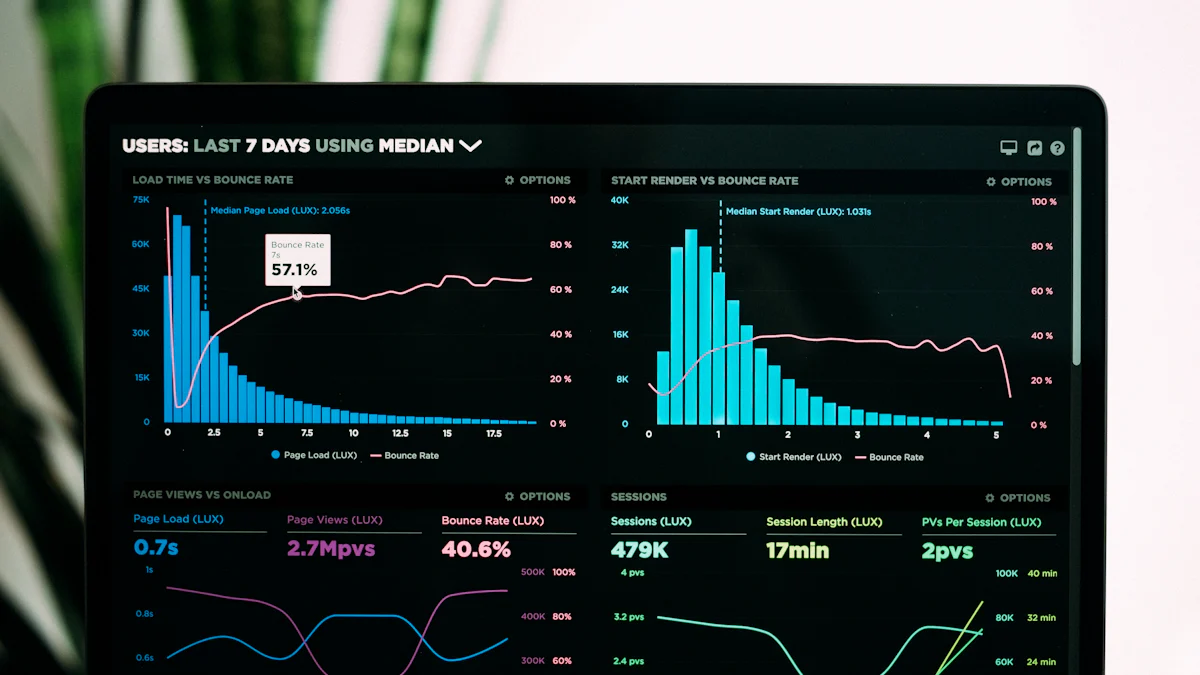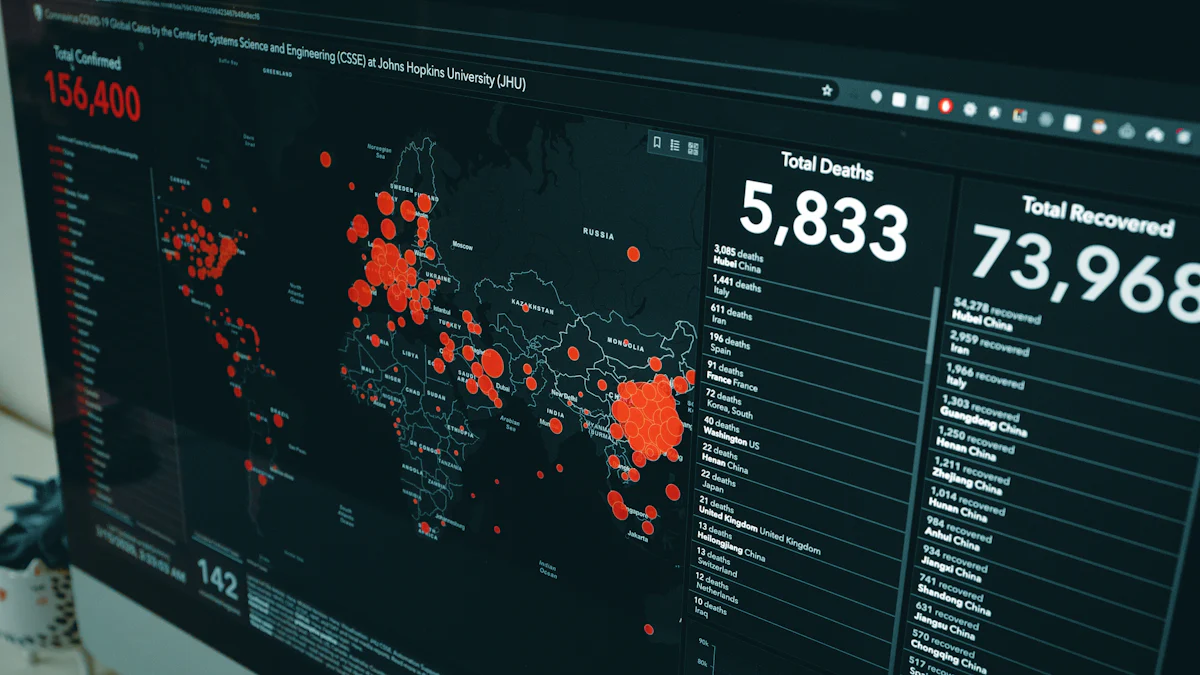How Big Data is Shaping the Future of Marketing Strategies

Big data is revolutionizing how you approach marketing. It empowers you to make smarter decisions by providing actionable insights into customer behavior. With a data driven marketing approach, you can tailor campaigns to individual preferences, predict trends, and engage with customers in real time. For example, companies like Netflix and Amazon use big data to personalize recommendations and enhance the customer experience, driving loyalty and sales. Similarly, businesses like Kroger and Airbnb leverage data to optimize marketing strategies and improve customer satisfaction. By harnessing big data, you can stay competitive and deliver exceptional experiences.
The Importance of Big Data in Marketing
Why Big Data is Essential for Modern Marketing
Big data plays a critical role in modern marketing by offering you a deeper understanding of your customers and their preferences. It allows you to analyze patterns, predict trends, and make informed decisions. Here are some reasons why big data is indispensable:
- Enhanced customer understanding: You can gain insights into customer preferences and behaviors.
- Predictive analytics: Forecast future trends and consumer behavior with greater accuracy.
- Improved decision-making: Use actionable insights to guide your marketing strategy.
- Personalization: Create tailored campaigns that resonate with individual customers.
By leveraging big data in marketing, you can stay ahead of competitors and deliver personalized experiences that foster loyalty.
The Role of Big Data in a Data Driven Marketing Approach
A data driven marketing approach relies on big data to optimize strategies and achieve better results. This approach empowers you to connect with your audience on a deeper level. By analyzing vast amounts of data, you can identify what works and refine your campaigns.
| Benefit | Description |
|---|---|
| Personalized Campaigns | Create highly-targeted campaigns with unique messaging for individual customers. |
| Improved Customer Understanding | Understand customer interests, lifestyles, and online activities for better engagement. |
| Increased ROI | Allocate resources efficiently to maximize returns on investment. |
Data-driven marketing also helps you identify effective content, understand customer needs, and optimize your strategies for higher revenue. This approach ensures that every decision is backed by reliable data and insights.
Understanding Customer Behavior Through Big Data
Big data in marketing enables you to understand customer behavior more effectively. By analyzing customer feedback, purchasing habits, and online activities, you can uncover valuable insights. For example, you can identify patterns in buying behavior, predict future trends, and segment your audience for targeted campaigns.
Real-time data analysis provides even greater value. It helps you improve customer experiences and boost retention. When you tailor your offerings and messaging to specific audiences, you create stronger connections and enhance satisfaction. Big data also allows you to optimize pricing strategies, improve product development, and anticipate customer needs.
By using big data analytics, you can make smarter decisions and deliver exceptional customer experiences. This not only strengthens loyalty but also drives long-term success in digital marketing.
Key Ways Big Data is Transforming Marketing Strategies

Personalization and Customer Segmentation
Tailoring Marketing to Individual Preferences
Big data enables you to create personalized experiences by analyzing customer preferences and behaviors. For instance, Starbucks uses data from its rewards program and mobile app to recommend products tailored to individual tastes. Netflix takes this further by analyzing viewing habits to suggest shows and even plans to develop custom trailers. Personalized marketing like this strengthens customer loyalty and drives engagement.
By leveraging big data, you can also optimize product recommendations and refine messaging to resonate with specific audiences. This approach ensures that your marketing strategy aligns with customer expectations, enhancing satisfaction and retention.
Identifying and Targeting Niche Audiences
Segmentation becomes more precise with big data. You can identify niche audiences by analyzing patterns in customer behavior. McDonald’s, for example, uses historical sales data and environmental factors to dynamically adjust digital menu offerings. Uber Eats combines data from its taxi service to predict delivery times and optimize routes, ensuring a seamless experience for niche markets.
With these insights, you can focus on smaller, highly-targeted groups, ensuring your marketing strategies are both efficient and impactful.
Predictive Analytics for Better Decision-Making
Anticipating Customer Needs
Predictive analytics transforms your marketing strategy from reactive to proactive. By analyzing historical data, you can forecast customer needs and tailor your offerings accordingly. Tools like IBM Watson Studio and Microsoft Azure Machine Learning help businesses predict trends and improve decision-making. For example, predictive analytics enables you to segment customers based on past purchases, ensuring your campaigns remain relevant and timely.
Forecasting Market Trends
Big data allows you to stay ahead of market trends. Platforms like Dataiku and SAS help you analyze patterns and predict future shifts. This ensures your marketing strategies align with emerging demands. Predictive analytics also enhances lead scoring, helping you prioritize high-value prospects. By leveraging these tools, you can optimize performance and maximize ROI.
Real-Time Marketing and Customer Engagement
Using Live Data for Instant Interactions
Real-time data empowers you to engage with customers instantly. Netflix uses big data to recommend content in real time, creating a seamless user experience. Similarly, Amazon leverages live data to personalize shopping experiences, boosting customer satisfaction.
This approach enhances customer engagement by enabling immediate responses to customer actions. It also builds trust and credibility, setting your business apart in a competitive market.
Enhancing Retention with Timely Responses
Prompt responses improve customer retention. Real-time engagement ensures you address customer needs as they arise. Kroger, for example, personalizes direct mail coupons using customer data, achieving a return rate far above the industry average. By responding quickly and effectively, you can enhance satisfaction and foster long-term loyalty.
Big data provides the tools you need to deliver exceptional customer engagement. By using live data and predictive analytics, you can create meaningful connections and drive sustainable growth.
Optimizing Marketing Campaigns and ROI
Measuring Campaign Performance
Big data provides you with the tools to measure marketing performance effectively. By analyzing key metrics, you can evaluate how well your campaigns are achieving their goals. These metrics offer valuable insights into what works and what needs improvement:
- Return on Investment (ROI): Understand the return generated for every dollar spent.
- Return on Ad Spend (ROAS): Assess the revenue earned from advertising efforts.
- Customer Lifetime Value (CLV): Estimate the total value a customer brings over time.
- Conversion Rate: Track the percentage of visitors completing desired actions.
- Cost Per Lead (CPL): Measure the cost of acquiring potential customers.
- Cost Per Acquisition (CPA): Focus on the expense of gaining new customers.
- Click-Through Rate (CTR): Evaluate how well your ads drive user interaction.
- Attention Metrics: Determine how effectively your ads capture attention.
By leveraging these metrics, you can refine your strategy and improve overall performance. For example, Fairmont Hotels used data to analyze visitor habits and optimize their website. This led to higher conversion rates and increased bookings. When you monitor these metrics consistently, you can make informed decisions that enhance your marketing performance.
Allocating Resources Effectively
Big data helps you allocate resources more efficiently by identifying high-performing channels. This ensures your budget is spent where it delivers the most value. For instance, Netflix uses data from its global audience to understand viewing behaviors. This allows them to invest in programs that resonate with their customers. Similarly, Twiddy uses data to analyze rental demand, providing pricing recommendations that boosted their portfolio by 10%.
You can also use data analytics to prioritize investments in areas that yield the highest ROI. By analyzing user data, you gain insights into which platforms and strategies drive the best results. This enables you to focus on initiatives that maximize returns. For example, Fairmont Hotels enhanced their user experience by optimizing their website based on customer behavior. This strategic use of data led to increased engagement and revenue.
When you allocate resources effectively, you not only improve marketing performance but also ensure sustainable growth. Big data empowers you to make smarter decisions, optimize your strategy, and achieve better results.
Challenges and Considerations in Big Data Marketing
Addressing Data Privacy and Security Concerns
Big data marketing relies heavily on collecting and analyzing customer information. However, this raises significant concerns about data privacy and security. Common issues include insufficient data privacy plans and the trading of sensitive customer data without consent. These practices can erode trust and damage your brand reputation.
To address these challenges, you should adopt robust strategies to protect customer information. Conduct regular audits of your data privacy practices to ensure compliance with laws like GDPR or CCPA. Certifications such as SOC 2 or ISO 27001 demonstrate your commitment to security. Educating employees about cybersecurity threats fosters a culture of data protection. Additionally, consent management platforms can automate compliance with regulations, while transparent communication with customers during breaches builds trust. Implementing these measures ensures your big data marketing efforts remain ethical and secure.
Overcoming Integration and Data Management Issues
Integrating big data into your marketing strategy can be complex. Challenges include collaborating with IT teams, translating data into actionable insights, and managing the speed of data processing. For example:
| Challenge | Description |
|---|---|
| Collaborating with IT | Marketers often depend on IT teams to access and utilize big data effectively. |
| Translating data into insights | The sheer volume of data can overwhelm marketers, making it hard to extract actionable insights. |
| Speed of data processing | The velocity of big data requires quick decision-making, which can be difficult with growing volumes. |
To overcome these issues, use data analytics tools to visualize insights and make informed decisions. Regular data backups and disaster recovery plans prevent loss and ensure continuity. Training employees on data handling best practices improves efficiency and reduces risks. These steps help you manage large volumes of data effectively and integrate it seamlessly into your marketing strategy.
Bridging the Skills Gap in Big Data Analytics
The skills gap in big data analytics poses a significant challenge for marketers. Studies show that 34.4% of marketers identify data analysis as a key area for improvement. This gap is even more pronounced in mixed B2B and B2C businesses, where 39.6% struggle with data integration. Many marketers rely on external talent, upskilling staff, or hiring consultancies to address this issue.
To bridge this gap, you can invest in corporate training programs tailored to your needs. For example, the Institute of Data offers courses that align with strategic goals and help identify skill gaps. Upskilling your team ensures they can analyze data from multiple channels and generate actionable insights. By addressing the skills gap, you can fully leverage big data marketing to enhance customer engagement and improve customer acquisition strategies.
How Businesses Can Leverage Big Data in Marketing

Investing in Advanced Analytics Tools
To fully harness big data, you need advanced analytics tools that simplify data collection, analysis, and visualization. These tools help you uncover actionable insights and optimize your marketing strategy. Some of the most effective tools include:
- SEMrush: Ideal for improving your online presence and making data-driven decisions.
- Tableau: Transforms raw data into interactive visualizations for better understanding.
- CleverTap: Combines analytics with automation to create personalized campaigns.
- Looker Studio: Enables deep analysis of customer behavior and campaign performance.
- Salesforce Marketing Cloud: Enhances your marketing strategies with robust analytics.
When choosing the right tool, evaluate your business needs and marketing goals. Consider your budget and ensure the tool integrates seamlessly with your existing systems. User-friendly tools like HubSpot or Mixpanel can make it easier for your team to adopt a data driven marketing approach.
Tip: Start with tools that align with your immediate goals and scale up as your data needs grow.
Building a Data-Driven Culture
Creating a data-driven culture ensures your entire organization values and uses data effectively. Leadership plays a crucial role in promoting this mindset. Leaders must actively support data initiatives and encourage employees to rely on data for decision-making.
To build this culture, focus on:
- Data Empowerment: Provide employees with access to data and train them to use it effectively.
- Collaboration: Foster teamwork across departments to improve data literacy and innovation.
- Value Realization: Define clear outcomes and key performance indicators (KPIs) for data projects.
You can also encourage employees to adopt a data-driven mindset by sharing success stories and offering training programs. For example, case studies showing how data improved customer engagement can inspire your team to embrace this approach.
Ensuring Ethical Data Collection and Usage
Ethical data practices are essential for maintaining customer trust. Transparency and permission should guide your data collection efforts. Always inform customers about how their data will be used and obtain their consent.
Key ethical considerations include:
- Transparency and permission.
- Data lifecycle management.
- Data minimization and purpose limitation.
- Enhanced security and privacy.
- Cross-border data transfers.
- Promoting a culture of data ethics.
Companies like Apple and IBM set excellent examples by prioritizing privacy and transparency. Apple uses on-device processing to minimize data collection, while IBM ensures its AI systems remain unbiased. Following these practices helps you build trust and ensures your data driven marketing approach aligns with ethical standards.
Partnering with Data Experts and Consultants
Collaborating with data experts and consultants can transform your marketing efforts. These professionals bring specialized knowledge and tools to help you unlock the full potential of your data. By partnering with them, you gain access to insights that refine your strategies and improve your results.
Data experts help you target ideal audiences with precision. They analyze customer behavior and provide detailed audience segmentation, enabling you to create focused campaigns. This approach ensures your messaging resonates with the right people, increasing engagement rates. Consultants also offer customized solutions tailored to your business needs, helping you achieve your campaign goals more effectively.
Staying competitive in today’s fast-paced market requires access to current trends and advanced analytic methods. Data consultants keep you informed about the latest developments, ensuring your strategies remain relevant. They also alleviate the strain of analytics on your team, allowing you to focus on other priorities. With their expertise, you can initiate projects quickly and execute them with confidence.
These partnerships go beyond technical support. Experts guide you in maximizing the use of your data, helping you identify untapped market segments and refine your overall approach. For example, they can recommend tools or platforms that streamline your processes and enhance decision-making. This guidance ensures you make informed choices that drive growth and improve ROI.
By working with data experts and consultants, you can elevate your marketing strategies. Their insights and support empower you to harness the power of data, delivering campaigns that resonate and succeed.
Big data is transforming marketing by helping you uncover actionable insights that drive smarter decisions. It enables you to deliver a personalized customer experience, fostering loyalty and engagement. For example, Spotify’s 'Wrapped' campaign uses data to create tailored summaries, boosting user interaction. By adopting a data-driven approach, you gain deeper customer understanding, make informed choices, and optimize campaigns for higher ROI. Businesses using personalization see up to an 8x return on marketing spend. Big data also supports sustainable growth by identifying trends like economic patterns and food security, ensuring your strategies remain impactful and future-ready.
FAQ
What is big data in marketing?
Big data in marketing refers to the collection and analysis of large volumes of customer information. It helps you understand behaviors, predict trends, and create personalized campaigns. This data includes online activities, purchase history, and social media interactions.
How does big data improve personalization?
Big data allows you to analyze customer preferences and behaviors. With these insights, you can tailor messages, offers, and recommendations to individual needs. This approach enhances customer satisfaction and builds loyalty.
What tools can help you analyze big data?
Tools like Tableau, SEMrush, and Salesforce Marketing Cloud simplify data analysis. They help you visualize trends, track campaign performance, and uncover actionable insights. Choose tools that align with your business goals.
Is big data marketing ethical?
Big data marketing can be ethical if you prioritize transparency and consent. Inform customers about how their data will be used and follow privacy regulations like GDPR. Ethical practices build trust and protect your brand reputation.
What are the biggest challenges in using big data?
Common challenges include data privacy concerns, integration issues, and a lack of skilled analysts. You can overcome these by investing in training, adopting secure practices, and using advanced analytics tools.
See Also
Key Influencer Marketing Data To Enhance Your Approach
Essential Influencer Marketing Trends To Monitor This Year
Grasping The Concept Of Product Seeding Today
20 Crucial Influencer Marketing Statistics Every Marketer Needs
